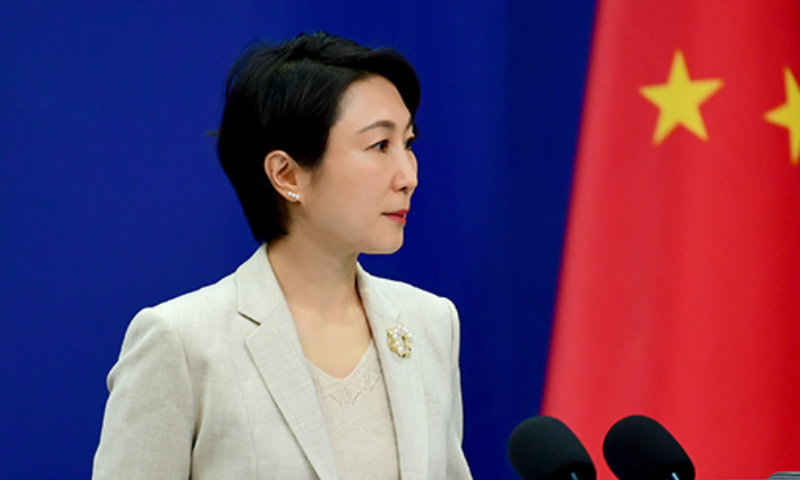
Chinese Foreign Ministry spokesperson Mao Ning Photo: fmprc.gov.cn
China suggests Philippines' President Ferdinand Marcos Jr read more to develop a proper understanding of the ins and outs of the Taiwan question, the Chinese Foreign Ministry spokesperson stated on Tuesday, in response to Marcos' comments on the Taiwan regional election results, with Chinese experts noting that there is disagreement within the Philippines on how to handle relations with China, and Marcos might be considering how to use the situation across the Taiwan Straits as a bargaining chip toward China.
Chinese Foreign Ministry spokesperson Mao Ning made the remarks during a regular press conference on Tuesday, after President Marcos on Monday congratulated Lai Ching-te, and expressed the desire for close collaboration in the years ahead, Reuters reported.
Mao said Marcos' remarks gravely violate the one-China principle and the communiqué on the establishment of diplomatic relations between China and the Philippines, seriously go against the Philippines' political commitments to China, and blatantly interfere in China's internal affairs. China strongly deplores and firmly opposes this and has immediately lodged strong representations to the Philippine side.
Mao said that Assistant Foreign Minister Nong Rong summoned the Philippine Ambassador to China Jaime Florcruz to lodge serious démarche and urge the Philippines to present a responsible response to China. "The election result of the Taiwan region cannot change the dynamics and direction of cross-Strait relations and cannot hold back the prevailing trend that China will and must achieve reunification," Mao said.
The spokesperson warned the Philippines that it should refrain from playing with fire on the Taiwan question, earnestly abide by the-one China principle and the joint communiqué of establishing diplomatic ties between China and the Philippines, immediately stop the wrong words and deeds on Taiwan-related issues and stop sending any wrong signal to "Taiwan independence" separatist forces.
Also on Tuesday, a spokesperson for the Chinese Embassy in the Philippines opposed Marcos' statement, stating that the one-China principle is the political basis for the establishment and development of diplomatic relations between China and 182 countries, including the Philippines. It is also a universally recognized norm for international relations and the consensus of the international community.
The Philippine side made a solemn commitment in the Joint Communique, and successive Philippine governments have followed the one-China principle since then. "The Philippine leader's remarks run counter to the one-China principle and contradict the statements of the Philippine government, sending wrong signals to the 'Taiwan independence' separatist forces," the spokesperson noted.
In a statement released on Sunday, the Philippine Department of Foreign Affairs said that it reaffirms the principles contained in the Joint Communique made by the two countries in 1975, and that the Philippines is committed to one-China Policy.
"The contradiction between the Philippine president's remarks and that of the foreign ministry shows that there is disagreement within the Philippines on how to handle relations with China," Gu Xiaosong, dean of the ASEAN Research Institute of Hainan Tropical Ocean University, told the Global Times on Tuesday.
Marcos' remarks violate the one-China principle, which China firmly opposes, Gu said, noting that the statement made by the Philippine Department of Foreign Affairs means that it still hopes to develop friendly and good-neighborly relations with China, and clearly knows that the Taiwan question is at the core of China's interests and a red line that cannot be touched.
"Some Southeast Asian countries, including the Philippines, have relatively close relations with Taiwan region because of long-standing economic and trade cooperation and people-to-people exchanges," Ge Hongliang, deputy director of the College of ASEAN Studies at Guangxi University for Nationalities, told the Global Times on Tuesday.
Ge noted that specifically in the case of the Philippines, it cannot be ruled out that Marcos has his own perception related to the Taiwan question, as the Philippines follows the US' strategy and cooperates with its actions on this question. Therefore, it is possible that the Philippines wants to use the situation across the Taiwan Straits as a bargaining chip toward China.
Chinese experts urged the Philippines to not go too far on the wrong path related to the Taiwan question, and hope that China and the Philippines can develop friendly relations and jointly manage the situation in the South China Sea to maintain regional peace and stability.




